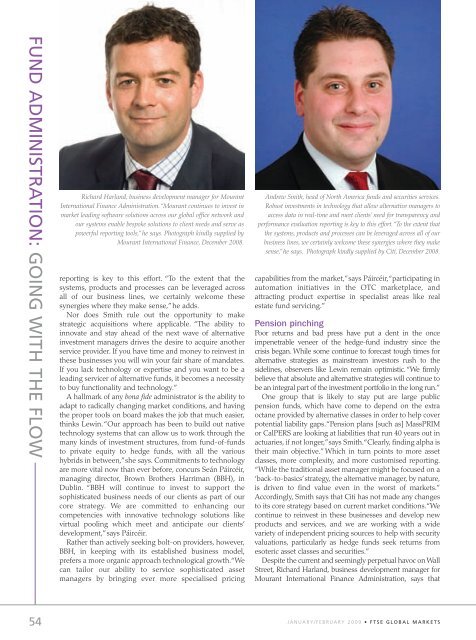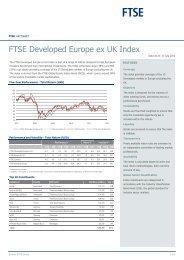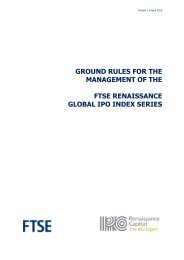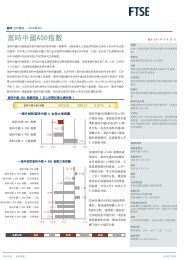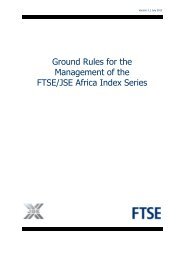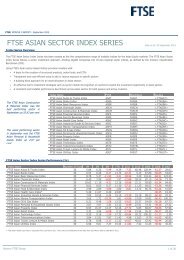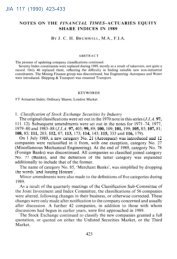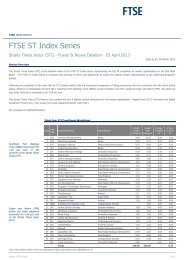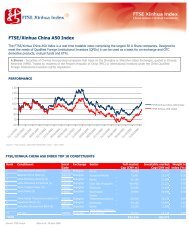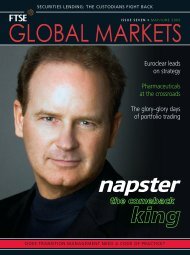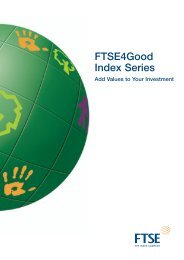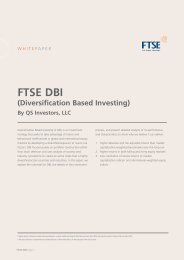Create successful ePaper yourself
Turn your PDF publications into a flip-book with our unique Google optimized e-Paper software.
FUND ADMINISTRATION: GOING WITH THE FLOW<br />
54<br />
Richard Harland, business development manager for Mourant<br />
International Finance Administration.“Mourant continues to invest in<br />
market leading software solutions across our global office network and<br />
our systems enable bespoke solutions to client needs and serve as<br />
powerful reporting tools,” he says. Photograph kindly supplied by<br />
Mourant International Finance, December 2008.<br />
reporting is key to this effort. “To the extent that the<br />
systems, products and processes can be leveraged across<br />
all of our business lines, we certainly welcome these<br />
synergies where they make sense,”he adds.<br />
Nor does Smith rule out the opportunity to make<br />
strategic acquisitions where applicable. “The ability to<br />
innovate and stay ahead of the next wave of alternative<br />
investment managers drives the desire to acquire another<br />
service provider. If you have time and money to reinvest in<br />
these businesses you will win your fair share of mandates.<br />
If you lack technology or expertise and you want to be a<br />
leading servicer of alternative funds, it becomes a necessity<br />
to buy functionality and technology.”<br />
A hallmark of any bona fide administrator is the ability to<br />
adapt to radically changing market conditions, and having<br />
the proper tools on board makes the job that much easier,<br />
thinks Lewin.“Our approach has been to build out native<br />
technology systems that can allow us to work through the<br />
many kinds of investment structures, from fund-of-funds<br />
to private equity to hedge funds, with all the various<br />
hybrids in between,”she says. Commitments to technology<br />
are more vital now than ever before, concurs Seán Páircéir,<br />
managing director, Brown Brothers Harriman (BBH), in<br />
Dublin. “BBH will continue to invest to support the<br />
sophisticated business needs of our clients as part of our<br />
core strategy. We are committed to enhancing our<br />
competencies with innovative technology solutions like<br />
virtual pooling which meet and anticipate our clients’<br />
development,”says Páircéir.<br />
Rather than actively seeking bolt-on providers, however,<br />
BBH, in keeping with its established business model,<br />
prefers a more organic approach technological growth.“We<br />
can tailor our ability to service sophisticated asset<br />
managers by bringing ever more specialised pricing<br />
Andrew Smith, head of North America funds and securities services.<br />
Robust investments in technology that allow alternative managers to<br />
access data in real-time and meet clients’ need for transparency and<br />
performance evaluation reporting is key to this effort.“To the extent that<br />
the systems, products and processes can be leveraged across all of our<br />
business lines, we certainly welcome these synergies where they make<br />
sense,” he says. Photograph kindly supplied by Citi, December 2008.<br />
capabilities from the market,”says Páircéir,“participating in<br />
automation initiatives in the OTC marketplace, and<br />
attracting product expertise in specialist areas like real<br />
estate fund servicing.”<br />
Pension pinching<br />
Poor returns and bad press have put a dent in the once<br />
impenetrable veneer of the hedge-fund industry since the<br />
crisis began. While some continue to forecast tough times for<br />
alternative strategies as mainstream investors rush to the<br />
sidelines, observers like Lewin remain optimistic.“We firmly<br />
believe that absolute and alternative strategies will continue to<br />
be an integral part of the investment portfolio in the long run.”<br />
One group that is likely to stay put are large public<br />
pension funds, which have come to depend on the extra<br />
octane provided by alternative classes in order to help cover<br />
potential liability gaps.“Pension plans [such as] MassPRIM<br />
or CalPERS are looking at liabilities that run 40 years out in<br />
actuaries, if not longer,”says Smith.“Clearly, finding alpha is<br />
their main objective.” Which in turn points to more asset<br />
classes, more complexity, and more customised reporting.<br />
“While the traditional asset manager might be focused on a<br />
‘back-to-basics’strategy, the alternative manager, by nature,<br />
is driven to find value even in the worst of markets.”<br />
Accordingly, Smith says that Citi has not made any changes<br />
to its core strategy based on current market conditions.“We<br />
continue to reinvest in these businesses and develop new<br />
products and services, and we are working with a wide<br />
variety of independent pricing sources to help with security<br />
valuations, particularly as hedge funds seek returns from<br />
esoteric asset classes and securities.”<br />
Despite the current and seemingly perpetual havoc on Wall<br />
Street, Richard Harland, business development manager for<br />
Mourant International Finance Administration, says that<br />
J A N U A R Y / F E B R U A R Y 2 0 0 9 • F T S E G L O B A L M A R K E T S


